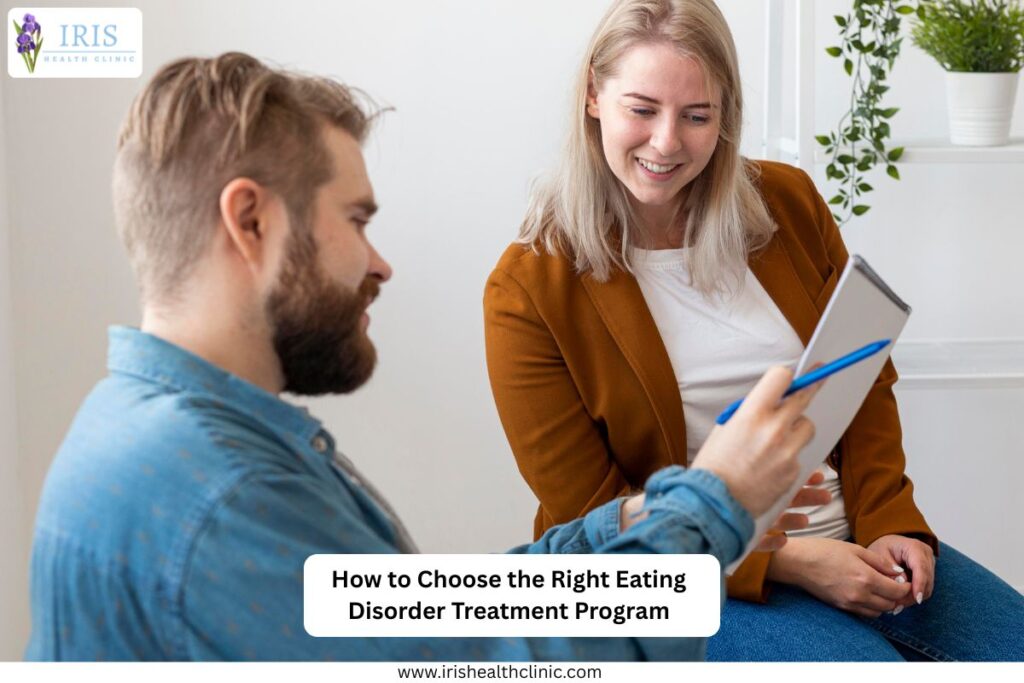Identifying the best treatment option for an eating disorder is among the most critical steps toward durable healing. There are ample selections of treatment, from residential treatment to outpatient therapy, that clearly lead to confusion about the best option for your care. At Iris Health Clinic, we see the selecting of treatment as an opportunity for empowerment rather than simply confusion.
This guide is created to prepare you with what to look for, questions worth asking, and a guide to find the best way forward toward recovery.
Having a better understanding of your needs is the first step. It is important to have a clear picture of your current health, lifestyle, and treatment goals before selecting an effective program. Think about it.
How serious are the symptoms of my eating disorder right now?
- Do I need flexible outpatient care or constant supervision?
- Do I have other mental health issues like anxiety, depression, or trauma?
- Do I need medical detox or nutritional counseling?
Knowing this will help us find a program that provides the right level of care and support.
🏥 Key Factors to Consider When Choosing an Eating Disorder Treatment Program
1. Level of Care
Different treatment levels serve different needs:
- Residential treatment provides constant care in a supportive environment.
- Partial hospitalization (PHP) involves intensive care during the day and returning home at night.
- Intensive Outpatient (IOP) includes several therapy sessions each week, which can be adjusted to fit work or school schedules.
- Outpatient therapy consists of frequent one-on-one sessions for ongoing recovery and preventing relapse.
➡ Choose a program based on your recovery speed, support system, and the severity of your symptoms.
2. Therapies Based on Evidence
Effective treatments for eating disorders include:
- Cognitive behavioral therapy (CBT) to challenge false beliefs about food and body image.
- Dialectical Behavior Therapy (DBT) to manage distress tolerance and emotional regulation.
- Family-Based Therapy (FBT), particularly useful for teenagers or those with strong family connections.
- The goal of nutritional counseling is to restore balanced eating habits and a healthy relationship with food.
At Iris Health Clinic, we combine these treatments with personalized, compassionate care.
3. Co-occurring Conditions and Dual Diagnosis
- People with eating disorders often face anxiety, depression, trauma, or substance abuse.
- A good program should offer dual diagnosis treatment to address both the underlying mental health issues and the eating disorder simultaneously for lasting recovery.

4. Accreditation and Qualified Staff
Verify that the program is licensed and accredited by established health organizations.
Look for the following:
- Staff comprising of licensed therapists, psychiatrists, and dietitians
- Interdisciplinary care teams
- Patient-to-staff ratios that are quite high
These are the conditions under which safety, ethical treatment, and high standards of care are assured.
5. Aftercare and Relapse Prevention
The patient’s recovery does not end with the treatment.
The facilities that are the most effective provide aftercare planning as a part of their treatment program, including:
- Therapy sessions that are still in progress
- Participation in support groups
- Nutrition maintenance plans
- Prevention of relapse strategies
Iris Health Clinic offers long-term support to its patients even after they have left the clinic, thereby, assisting them to gain confidence and independence in real-world situations.
Why Opt for Iris Health Clinic for Eating Disorder Therapy
Iris Health Clinic has made its treatment plans focusing on the entire human being — psychosocially, physically and spiritually.
With a mixture of scientifically proven therapies, supportive therapists, and customized healing roadmaps, we are with the patients in all phases of their rehabilitation.
The practitioner can provide each client with the individual support they need to develop a healthier relationship with food and themselves through comprehensive and trauma-sensitive approaches.
Frequently Asked Questions
- How does treatment for eating disorders differ between inpatient and outpatient settings?
In outpatient treatment, patients stay at home and attend therapy sessions regularly. In contrast, patients in inpatient programs receive constant care. Your medical and psychological needs will help determine the best option. - How long does treatment for eating disorders usually last?
The length of treatment depends on the level of care needed and the patient’s progress. Programs generally last from a few weeks for outpatient care to several months for residential treatment. - Is family involvement important in the treatment of eating disorders?
Yes, family involvement can be especially important for younger patients. Many programs — ours included — provide family therapy sessions within the treatment portfolio to assist communication and support. - Is it possible for the insurance to cover eating disorder treatment?
Partial or full treatment costs are covered by many insurance plans. The admission department of the Iris Health Clinic will check your benefits and offer you affordable care options. - How will I know that professional treatment is necessary for me?
When your eating habits start taking a toll on your health, mood, or relationships, or when you feel that food is overpowering you, you need to get help. Early intervention leads to better long-term recovery outcomes.
Start the Healing Process
Finding the best eating disorder treatment program is a very personal choice — however, you can always count on us to help you.
We, at Iris Health Clinic, will be right beside you, offering you our support that consists of empathy, professionalism, and constant support.
📞 Reach out to us now if you would like to know more about our individual treatment plans and take your first step towards recovery of a lifetime.

